What Makes the Sphynx Cat a Unique Pet Choice?
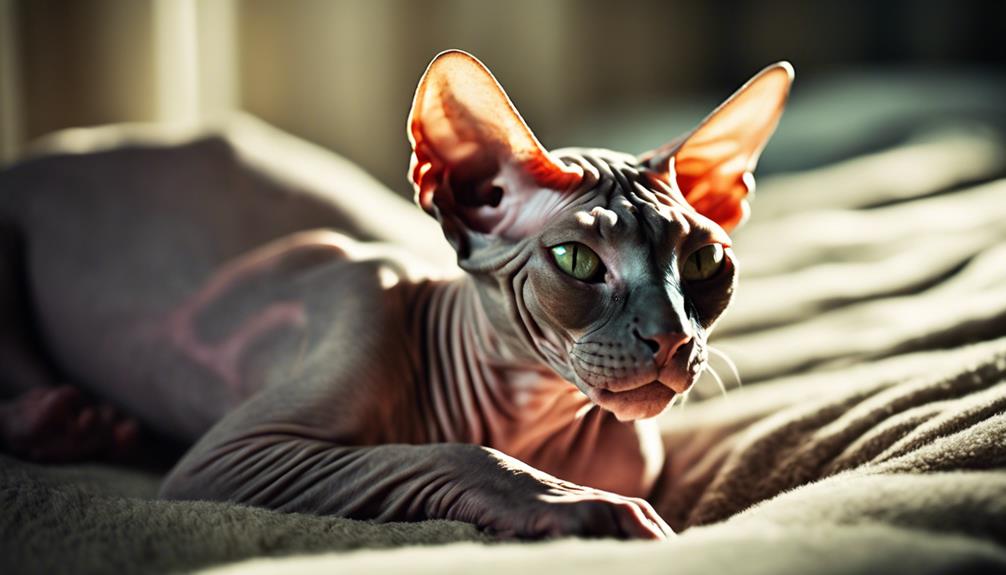
The Sphynx cat's hairless body, large ears, and wrinkled skin set it apart from other breeds, creating a visually striking and memorable presence.
Their playful and affectionate nature makes them loving and devoted companions, forming strong bonds with their human families.
Despite their lack of fur, Sphynx cats require regular grooming to maintain healthy skin and prevent oil buildup, showcasing their need for specialized care and attention.
Distinctive Hairless Appearance
The Sphynx cat captivates with its uniquely hairless charm, setting it apart from traditional feline breeds. This breed is known for its distinctive lack of fur, which reveals its smooth, velvety skin. Despite the absence of a typical coat, Sphynx cats may have a light peach fuzz or even a soft downy layer resembling chamois leather. What makes them even more intriguing is their skin pigmentation and patterns, akin to their furry counterparts, making each Sphynx cat visually striking and individualistic.
Their hairless appearance requires special attention to skin health. Due to the lack of fur to absorb oils, Sphynx cats may need regular bathing to prevent oil buildup. Additionally, their exposed skin makes them susceptible to temperature changes, necessitating a warm environment and protection from the sun to prevent sunburn. Understanding and addressing the unique needs of a hairless cat like the Sphynx is crucial to ensuring their well-being and happiness.
Affectionate and Playful Nature
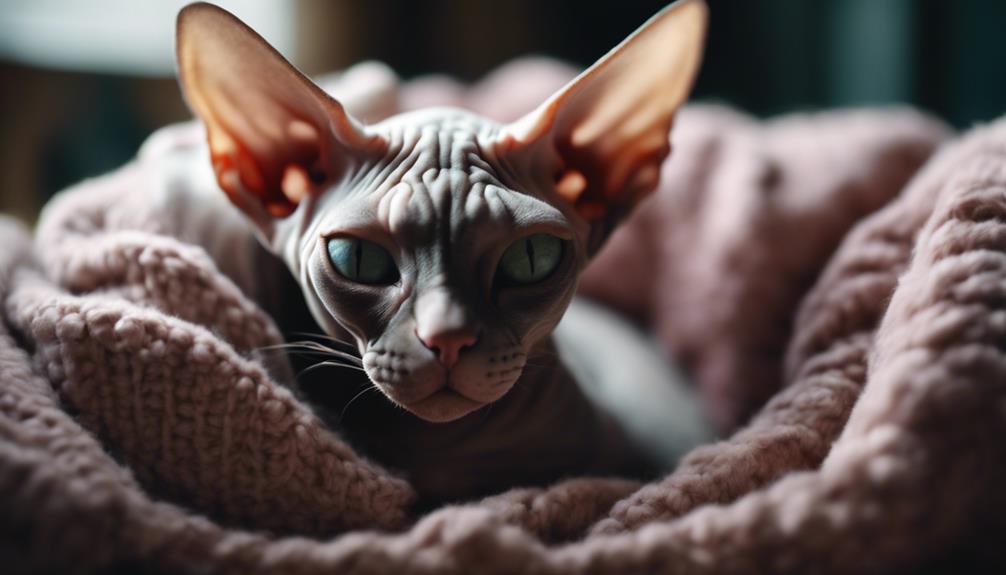
Transitioning from their distinctive hairless appearance, Sphynx cats exhibit an affectionate and playful nature that endears them to their owners and makes them delightful companions. These unique felines aren't only loving and devoted but also highly social creatures, forming strong bonds with their human family members.
Their intelligence shines through their interactive behavior, as they enjoy playing games and exploring their environment with enthusiasm. Sphynx cats are known for their energetic and curious personalities, often seeking out ways to engage with their owners and other pets.
What sets them apart is their dog-like loyalty, combining the best traits of a loyal canine with the affectionate nature of a feline. Their playful antics and loving demeanor make them a joy to have around, providing endless entertainment and companionship.
Sphynx cats truly stand out as affectionate, playful, and uniquely devoted pets that bring warmth and joy to any household.
Special Care Requirements
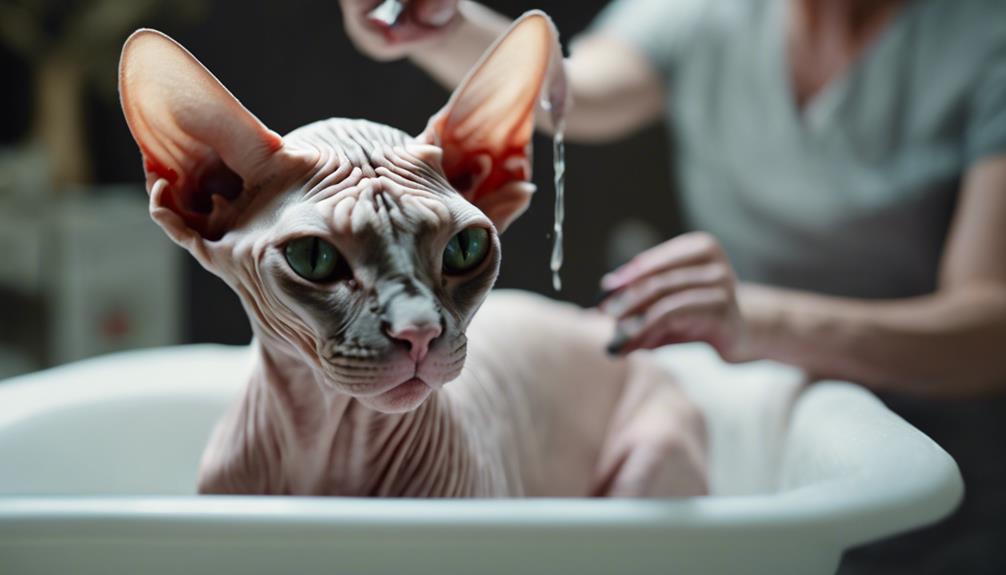
When caring for a Sphynx cat, it's crucial to be mindful of their special requirements to ensure their health and well-being. Due to their unique appearance as a hairless cat, Sphynx cats require regular bathing to prevent skin problems caused by oily residue buildup.
Their sensitive skin also needs protection from the sun, making sunscreen or providing shade essential to prevent sunburn and skin cancers. Keeping them as indoor cats is highly recommended to avoid potential health issues that may arise from their lack of protective fur.
In addition to skincare, regular dental care and nail trimming are crucial for their overall well-being. Investing in a cat tree can help satisfy their athletic and curious nature while ensuring their safety indoors.
Unique Personality Traits
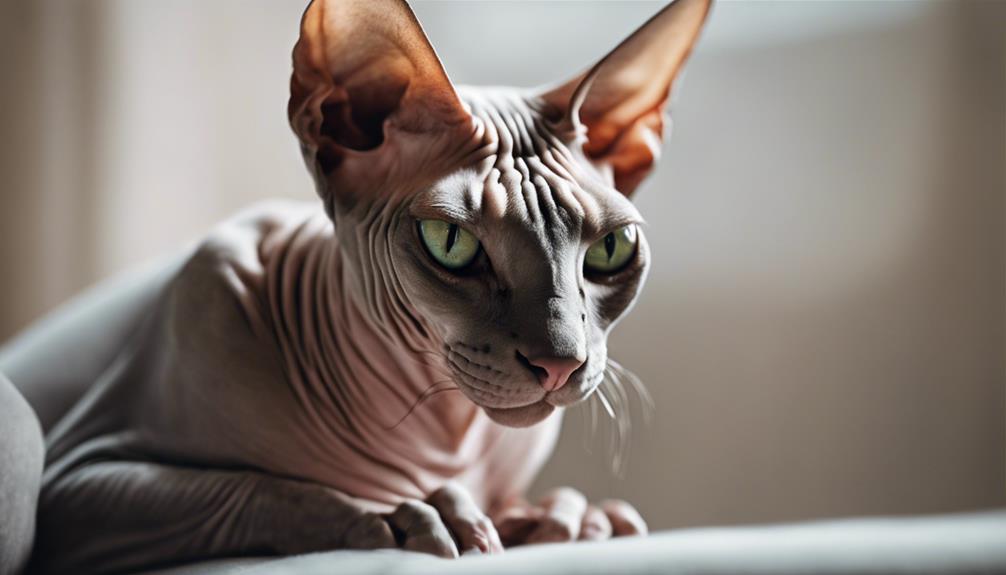
With their dog-like friendliness and outgoing nature, Sphynx cats are renowned for forming strong bonds with their owners and seeking affectionate attention. These unique felines aren't only intelligent but also incredibly social, enjoying the company of both humans and other animals, particularly other Sphynx cats. Their playful and energetic temperament makes them great companions for interactive play and simulated hunting games. Sphynx cats exhibit warmth-seeking behavior, often snuggling close and seeking comfort under covers for companionship.
Their loyalty to their owners is unmatched, and they thrive on human interaction, making them excellent pets for those seeking constant companionship. Additionally, their hypoallergenic nature sets them apart, as they produce less dander than other cat breeds, making them a suitable option for individuals with allergies. Overall, the Sphynx cat's unique blend of affectionate, outgoing, and intelligent traits makes them a delightful and engaging pet choice for those looking for a special feline companion.
Health Considerations for Sphynx Cats
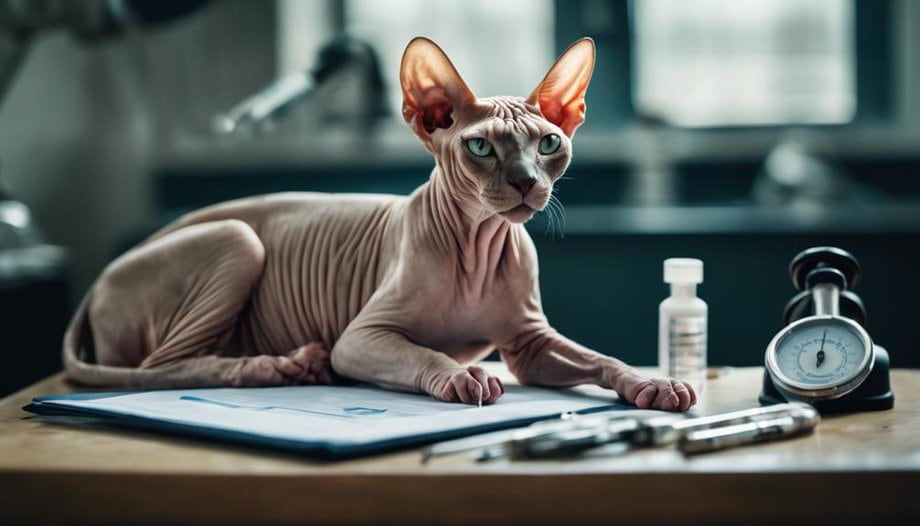
Sphynx cats require diligent skin care routines and protection from the sun to prevent infections and sunburn. Additionally, they're predisposed to hypertrophic cardiomyopathy and congenital myasthenic syndrome, necessitating regular monitoring and veterinary attention.
Being proactive in addressing these genetic health concerns is essential to ensuring the overall well-being of Sphynx cats.
Skin Care Needs
Regular skin care is essential for maintaining the health and well-being of your unique Sphynx cat due to their special needs related to furless skin. Sphynx cats are prone to sunburn and skin infections due to their sensitive skin, requiring indoor living and sun protection measures.
It's crucial to clean the skin folds and wrinkles regularly to prevent irritation and infections. Veterinary check-ups play a vital role in monitoring skin health and addressing any dermatological issues promptly.
Establishing a consistent skincare routine that includes gentle bathing and moisturizing is key to keeping your Sphynx cat's skin healthy and radiant. By prioritizing their skin care needs, you can ensure your Sphynx cat's overall well-being and happiness.
Genetic Health Concerns
Maintaining the health and well-being of a Sphynx cat involves understanding and addressing their genetic health concerns, which can significantly impact their overall quality of life. Sphynx cats are prone to hypertrophic cardiomyopathy (HCM), a common heart condition in the breed. Due to their lack of fur, they have a higher risk of skin infections and sunburn. Additionally, they may be susceptible to congenital myasthenic syndrome, leading to muscle weakness. Regular veterinary check-ups are crucial to monitor and address potential health issues early on. Owners should be aware of these specific health concerns to provide proper care and preventive measures.
| Health Concerns | Description |
|---|---|
| Hypertrophic Cardiomyopathy | Common heart condition in Sphynx cats |
| Skin Infections and Sunburn | Higher risk due to lack of fur protection |
| Congenital Myasthenic Syndrome | Affecting muscle strength and coordination |
Sphynx Cat Breed History
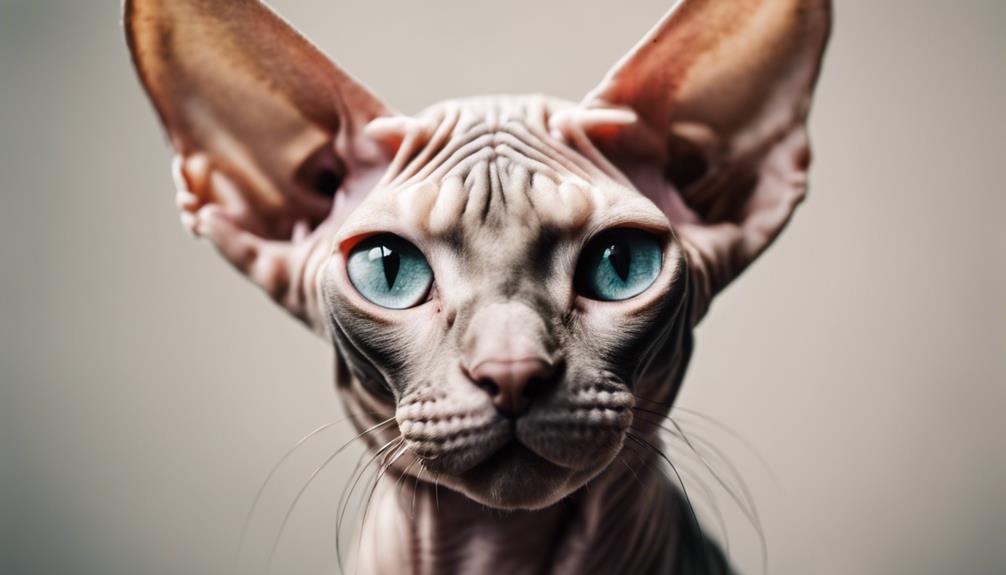
With roots tracing back to the breeding efforts in Canada in 1966, the fascinating history of the Sphynx cat breed unfolds a tale of deliberate selection and unique genetic diversity. The Canadian Hairless, as they were initially known, were the result of selective breeding aimed at creating a distinct feline with a unique appearance. Here are some key points that shed light on the breed's development:
- Crossbreeding with Devon Rex Cats: Sphynx cats have a unique history of crossbreeding with short-haired Devon Rex cats to maintain genetic diversity.
- Official Recognition: The breed was officially recognized by the Cat Fanciers Association in 2002, solidifying its place in the world of pedigree cats.
- Distinctive Appearance: The breed's development involved careful selection to emphasize their distinctive hairless appearance, setting them apart from other breeds.
- Characteristics: Sphynx cats are known for their sensitive skin, large ears, wide eyes, and energetic nature, all of which reflect their unique breeding history.
Fun Facts About Sphynx Cats
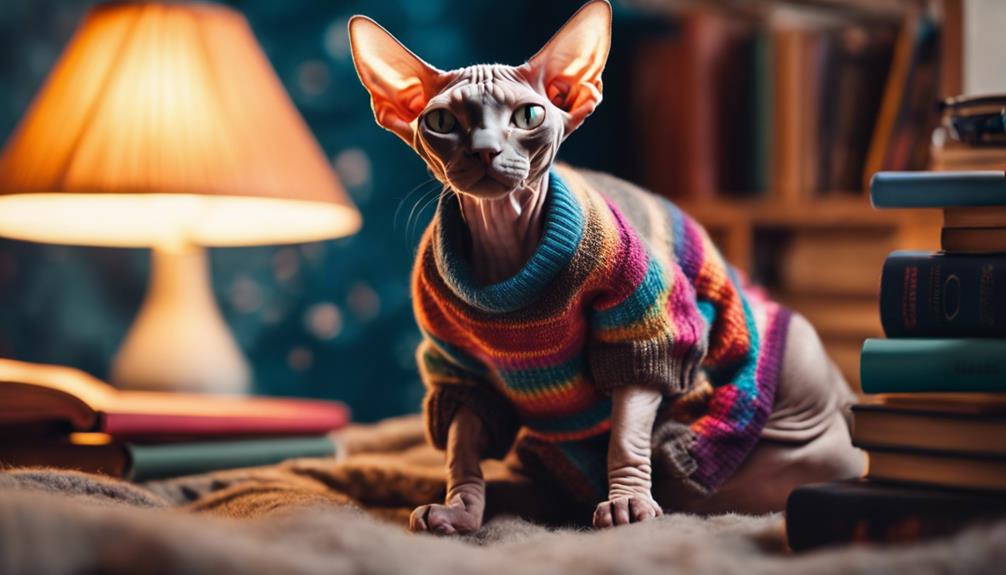
The intriguing world of Sphynx cats is filled with captivating fun facts that showcase their unique charm and distinctive qualities. These hairless cats have a normal body temperature slightly warmer than other breeds, making them feel like little warm heaters when snuggled up close. Renowned for their affectionate nature, Sphynx cats are often ranked as one of the most loving and cuddly cat breeds, seeking constant companionship from their human counterparts. Their baldness isn't a result of neglect but rather a unique gene that sets them apart in the feline world.
Interestingly, famous personalities like Steven Tyler and Lady Gaga have been known to share their homes with Sphynx cats, adding to the allure of these unique pets. However, due to their lack of fur, Sphynx cats are at a higher risk of sunburn and require protection from direct sunlight to keep their sensitive skin safe. These fun facts make Sphynx cats not only a unique pet choice but also a delightful and affectionate companion for those seeking a special feline friend.
Frequently Asked Questions
How Are Sphynx Cats Different From Other Cats?
Sphynx cats stand out due to their hairless bodies, large ears, and affectionate nature. Their high energy levels, intelligence, and vocal tendencies make them unique. They need special skin care and are known for being social and playful pets.
Why Do Some People Like Sphynx Cats?
People appreciate Sphynx cats for their unique appearance, hypoallergenic qualities, playful demeanor, affectionate nature, social behavior, energetic personality, high intelligence, curious nature, vocal tendencies, and loyal companionship. These felines offer interactive and engaging companionship for those seeking a special pet.
Do Sphynx Cats Have Special Needs?
Sphynx cats have unique needs. They require regular grooming, special diets, and vet check-ups for health issues. Their sensitivity to temperature means they prefer warmth. They thrive on social interaction and need active owners for playtime.
What Do I Need to Know About Owning a Sphynx Cat?
Owning a Sphynx cat involves regular bathing, skin care, specific feeding schedules, and indoor playtime. Vigilance is needed for sun exposure and heart conditions. These active cats thrive on companionship, warmth, and interactive toys for mental stimulation.










